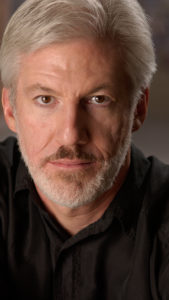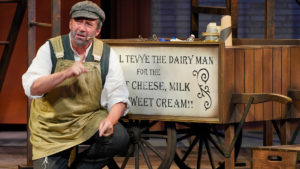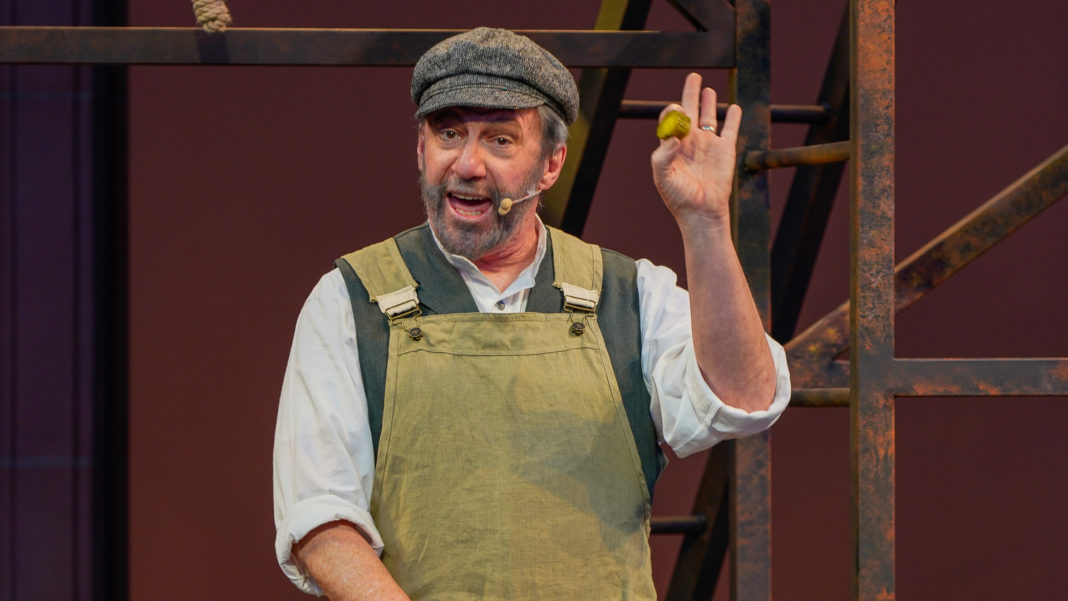Arguably one of the most beloved characters in musical theater is Tevye from the musical Fiddler on the Roof. Since its debut in 1964, there have been five revivals on Broadway. After Zero Mostel originated the part the role has proven to be very appealing to actors as well as audiences. Enter Tom Dugan.
Tom Dugan, perhaps best-known for his one-man show Wiesenthal, has written a new play that takes its inspiration from some of the stories by Sholem Aleichem that did not find their way into the musical. The play, Tevye in New York, reveals what happens to the Jewish milkman and his wife after his three daughters have left Anatevka.
The Wallis Annenberg Center for the Performing Arts has just opened the world premiere engagement of Tevye in New York. Just prior to starting previews, I spoke by phone with Dugan about taking on such a beloved character, why he remains so popular and what he’s learned from Tevye. What follows are excerpts from that conversation that have been edited for length and clarity.

When you tackle a character like Tevye, who has been brought to life by the likes of Zero Mostel, Topol and even Harvey Fierstein, what challenges do you face in giving the audience the character they have come to love, but still make it your own?
I’m very mindful of that. It’s a play about his growth and development and how he has to change with the changing times. I knew when I walked on stage I had to be recognizable as Tevye first. I can’t come out and say, “This is the new Tevye.” Little by little it takes us to a place where Tevye’s mind is open to new things.
I believe more than anything else in our popular culture, the film version is what is most indelibly marked in the mind. So I am going to try to emulate as much as I can of Topol in the beginning of the play so people recognize him. Then we’ll take that character into a brand new place. He’ll be doing things that the Tevye in the musical never did go through and could never conceive of.
In the wonderful documentary Fiddler: A Miracle of Miracles they showed a production in Japan of the musical where the cast was asking how the musical could be so Japanese. In other words, these stories are universal. Does Tevye in New York serve as a universal story as well?
I think I have a lot of help because I have Sholem Aleichem on my side. What Joe Stein [book writer of Fiddler on the Roof] did so brilliantly was to take a lot of what Aleichem had written, take the essence of it and then change it. Rewrite it. That’s what I’ve done. The majority of the Tevye stories are not included in Fiddler on the Roof. There are four stories people don’t know about that are more powerful than what’s in the musical. I’m taking from the original stories just as Stein did and I’m creating a one-man play with it.
Harry Stein, son of Joseph Stein, said that there were some in the Jewish community who felt that “Fiddler was a betrayal of much that gave that experience and weight and instead became a parable of assimilation in which the tragic core of the original Shalom Aleichem stories is replaced with an all-American optimism.” Do you agree with that perspective?
I’m not sure. Everybody has their opinions and Aleichem went from the darkest of dark stories to the lightest of light stories. When I spoke with the Sholem Aleichem family they invited me, just before the pandemic, to an island off of New York where they have the estate and the family has a reunion every year to celebrate his work. Aleichem asked on his deathbed please get together and celebrate my work. Please do not focus on the sad stuff. I don’t think that Fiddler on the Roof would have displeased him in any way shape or form. Especially the success of it.

This is not the first time a continuing story about Tevye has been created. Alexandra Silber, who played Hodel on stage, wrote a novel following that character’s story after the musical. Why do people want to create new stories for these characters and why do audiences want to read or see them?
I think it is because they see themselves on stage. These characters are so well written from the original stories. It’s not black and white. They have faults, they make mistakes, sometimes they say and do ugly things. Then they go on and try harder and they do something else and you grow a greater respect and connection with them beach that’s what we all do. We’re making it up as we go along.
Sometimes the hero knows what to do. Tevye ain’t that. Men, women, children all appreciate the fallibility of the character. The reason that he’s popular is because they either see themselves, their husbands or their father up on stage.
Whom do you see?
My connection is not a small one. I played Tevye in high school as a 17-year-old. That was the part that made me say I want to do this for the rest of my life. So Tevye looms large in my life. When I original did it, who did I see? I saw my father.
What has Tevye taught you?
From the first time in high school I saw the power of how the character and the play could bring people together. I don’t want to get too snobby, but I grew up poor. With poverty comes alienation in the family and depression and anger. I remember opening night and my parents came. I got home at three in the morning. I was tip-toeing. There was my uncle, aunt, father and mother laughing their heads off. I just marveled how that play, that character, had brought these people who were living a pretty sad existence together. That’s when I thought that’s the power of theater and the character and I want to play characters like this.
Tevye in New York runs at The Wallis through July 25th.
Photo: Tom Dugan in Tevye in New York (Photo by Lawrence K. Ho/Courtesy The Wallis)










